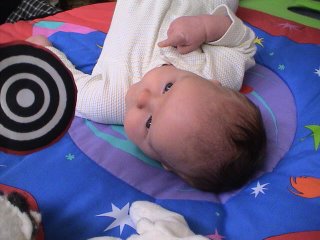
last week i watched two DVDs about intelligence. one was about a practice called "hothousing," where parents become obsessed with their child's early development and learning. these parents push their children to learn math and reading skills very early, and also get them to memorize all kinds of facts and details, building an impressive encyclopedic knowledge about specific things...like how to recognize and name all the varieties of roses, or different kinds of military aircraft. the kids can do this stuff fairly easily...their minds are capable of it, and they even seem to enjoy the intensive learning sessions. but the film exposed the kinds of myths that proponents of hothousing operate under, and basically de-bunked all of them. one of the myths is a "use it or lose it" concept where if child is not exposed to certain kinds of stimulus at an early age, that those particular synapses won't get developed, and there will never be a chance to learn those things again. and there is a general myth about the importance of the first 3 years. another one is about the importance of offering a stimulating environment for babies and toddlers, to enhance their intelligence. the film argues that the current science on the brain and intelligence doesn't really support these myths. there is no link between the NUMBER of synaptic connections and intelligence, for instance, so encouraging more connections is not necessarily helpful. in fact, the goal may be the establishment of fewer connections, for a more efficient, streamlined kind of brain activity. also, it has not been proven that children who learn things way earlier than other kids are at any advantage academically or otherwise, especially as kids get older. the ones who learn later, catch up rather quickly, and one has to ask, what did the kids who spent their toddler years performing drills and quizzes miss out on.
i personally feel like the development of encyclopedic knowledge is much less important than the development of the imagination, or sensitivity to others, for instance. and this brings us to the development of Emotional Intelligence...the topic of the second DVD. Emotional intelligence is often neglected in academic settings, especially with the increased focus on standardized testing. Yet these kinds of skills are far more important for a person's success, and i would argue--happiness, than the types of skills which can be measured in test scores. i think it is pretty obvious too that the pressure to perform can be very damaging. most of us have known people who are highly intelligent, yet lack useful social skills, and suffer tremendously for this.
the good news is that emotional intelligence can be learned and improved at any stage in life. it is never to late.
however, it is also never to early to begin teaching such skills, and i hope to be able to share this kind of learning with Cosmo right away. of course, one of the problems is that so many of us adults are lacking in these crucial skills.
good thing it is never too late to learn.
i highly recommend the book A General Theory of Love by Thomas Lewis, Fari Amni, and Richard Lannon.


No comments:
Post a Comment